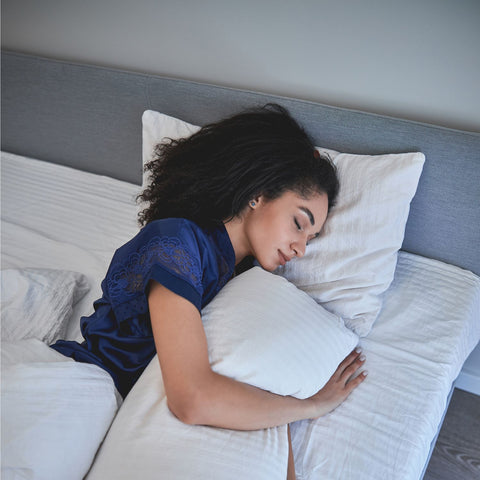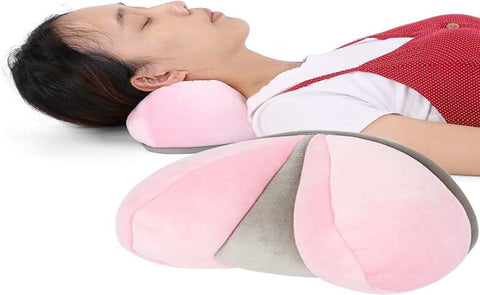Choosing the right sleeping position can significantly impact your sleep quality and overall health. When you sleep with your arm under your pillow, you might find that it aids in aligning your body, potentially leading to a better night's rest. Your sleeping setup, including the position you sleep in, the type of pillow you use, and the mattress you rest on, is critical for achieving optimal comfort. This configuration may alleviate pressure on various parts of the body and can be particularly beneficial for those looking to ease certain types of discomfort.
However, it's important to consider that sleeping with your arm under your pillow isn't without potential drawbacks. There could be implications for your muscles and joints, possibly leading to pain or discomfort. Ensuring you have a supportive mattress and pillow tailored to your sleeping habits is essential for maintaining comfort and preventing strain on your body. A suitable pillow can help accommodate your preferred sleeping position while avoiding nerve compression and promoting better sleep ergonomics.
Understanding how to effectively use your pillow and arrange your arms can enrich your sleep experience. For side sleepers, using a strategically placed pillow may help support the entire arm, thereby reducing the risk of nerve compression syndromes and maintaining neutral wrist and finger positions. If you're accustomed to sleeping on your back, positioning your arms at your sides on pillows might also provide a comfortable and supportive alternative, conducive to restorative sleep.
Ergonomic Benefits of Sleeping with Arm Under Pillow
Sleeping with your arm under a pillow can contribute to better ergonomic sleep by providing improved alignment and support. This practice may potentially alleviate shoulder and neck discomfort, offering a more restful sleep.
Alignment and Support
Placing a pillow between your arms can aid in maintaining proper spinal alignment during sleep, particularly for side sleepers. A well-designed memory foam pillow can offer the necessary shoulder support to keep the spine straight and reduce strain. An arm pocket, or a pillow with a built-in tunnel, allows you to extend your arm comfortably, thereby enhancing support and preserving the natural alignment of your neck and spine.
Reducing Pain and Discomfort
- Shoulder Pain: By using a pillow that accommodates the shoulder's natural curve, you help distribute weight evenly, minimize pressure points, and decrease the likelihood of waking up with shoulder pain.
- Neck and Back Pain: Consistent alignment and support may reduce the incidence of neck and back pain, symptoms often associated with incorrect sleeping postures.
- Circulation: A supportive sleeping position keeps blood flow unobstructed, which is important for overall circulation and can prevent numbness and tingling in your extremities.
- Restful Sleep: Minimizing pain and discomfort naturally leads to more restful and uninterrupted sleep, ensuring that you wake up feeling refreshed.
Choosing the Right Pillow for Optimal Comfort
Selecting the right pillow is essential for achieving a comfortable night's sleep, especially if your preferred sleeping position involves placing your arm under the pillow. Comfort is not just about softness; it encompasses the pillow's shape, size, and material, all of which can affect your sleep quality and physical health.
Factors Determining the Best Pillow
To find a pillow that facilitates comfort and proper alignment during sleep, here are several key factors to consider:
- Pillow Size: Consider the size of your pillow relative to your mattress size. For instance, queen pillows are 20 inches by 30 inches, providing ample space for movement.
- Material: A variety of materials are available, including memory foam, shredded memory foam, and feathers. Each has unique properties, like memory foam contours to your shape, while feathers offer a softer feel.
- Loft and Firmness: The pillow’s loft, or height, together with its firmness can affect neck support and spinal alignment. Side sleepers generally require a pillow with a higher loft to fill the gap between their shoulder and neck.
- Shapes and Cut-Outs: Pillows designed for side sleepers often feature contoured shapes or arm holes to reduce shoulder discomfort.
Specialty Pillows for Enhanced Sleep Quality
Depending on personal preference and specific needs, specialty pillows can improve sleep quality:
- Side Sleeper Pillows with Arm Holes: Examples like the Good Pillow and HOMCA Memory Foam Pillow are molded for arm placement without causing numbness.
- Travel and Body Pillows: Travel pillows offer neck support on the go, whereas body pillows provide full-body support that is particularly beneficial during pregnancy or for side sleeping.
- Adjustable Pillows: Features like adjustable height and density allow for customization to your preferred comfort level.
- Hypoallergenic Options: For those with allergies, hypoallergenic materials can be a crucial consideration.
- Support Pillows: Wedge pillows or those with lumbar support can alleviate pressure points and back discomfort.
When choosing a pillow, focusing on these specifics can guide you in finding a product that complements your sleeping habits while ensuring you wake up rested and without aches.



